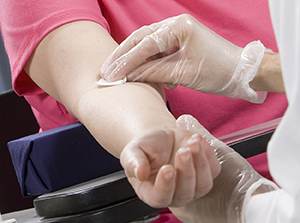For Teens: Understanding HIV/AIDS
For Teens: Understanding HIV/AIDS

What to look for
It may take years for AIDS symptoms to appear. But a few weeks after HIV enters the body, you may have symptoms such as:
Fever
Sore throat
Trouble swallowing
Headaches
Muscle and joint aches
Rash
Fatigue
These symptoms may last for a few days to several weeks, and seem like the flu. So if you’re at risk of HIV, get tested. It’s the only way to know for sure. HIV testing is available at most health clinics. You can also learn more about testing by calling CDC-INFO at 800-232-4636.
Antiretroviral therapy
Antiretroviral therapy involved using several different HIV drugs that work in different ways to control the virus and protect your immune system. HIV and AIDS can’t be cured, but these medications can help you live a more active life. Some medications help the body resist diseases. Others reduce symptoms. If you have HIV, you must practice safer sex to protect others. This means always using latex condoms during any kind of sex. It also means telling your partner you have HIV before having sex.
If you don’t get treated
Over time, AIDS and HIV weaken the body. This makes it easier for you to get sick and have:
Diarrhea and weight loss
Night sweats
Itchy rash
Skin lesions
Chronic cough
Confusion
Trouble breathing
Swollen glands and thrush (white spots in the mouth)
Lung infections such as pneumonia or meningitis (brain infection). Some infections can lead to death.
Stop the spread of HIV. Always use latex condoms. If you are at risk for HIV, get tested. And if you have HIV, tell your partner before sex.
Updated:
November 06, 2017
Sources:
Acute and early HIV infection: Treatment, Up To Date, When to initiate antiretroviral therapy in HIV-infected patients, Up To Date
Reviewed By:
Adler, Liora, C., MD,Fetterman, Anne, RN, BSN,Image reviewed by StayWell art team.